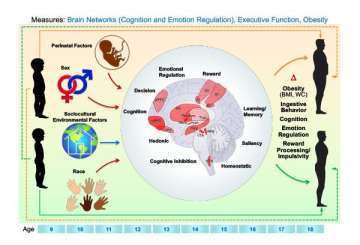Research
Obesity has become one of the most common and costly of health problems in the US, and while the primary contributing factors of overeating and poor food choices are well known, underlying biological mechanisms are poorly understood and treatments aimed at changing maladaptive eating behaviors have shown disappointing long-term outcomes. Lifestyle, diet, and cognitive behavioral interventions, the most common of these treatments, may provide between 7-10% reduction in initial weight but little impact at longer time intervals. Improving both the targeting of these treatments and selection of patients most appropriate for a particular treatment depends on a better understanding of mechanisms underlying eating behaviors, how these mechanisms differ across patient groups, and how these mechanisms are impacted by psychosocial-environmental factors and specific treatments.

Therefore, the lab’s programmatic line of research, broadly defined, focuses on investigating the bidirectional interactions between the brain and peripheral factors (e.g. inflammatory markers, gut microbiota-related metabolites) and how these interactions are modified by vulnerability (early adversity, sex, race, adult stress, socioeconomic status [SES], diet) and protective (resilience, exercise) environmental factors in contributing to the pathophysiology of altered ingestive behaviors and obesity (Figure 1). In addition, we are investigating treatment induced changes in brain-immune-microbiome interactions. We are dedicated to applying advanced bioinformatics techniques, which allow me to integrate information from multiple data sources including multimodal neuroimaging data, in addition to microbial, immune and clinical parameters, while accounting for sex and race differences.
The lab’s long-term goal is to develop a comprehensive model that provides powerful and sensitive biomarkers, which will increase biological readouts of obesity and dysfunctional eating behaviors over time. These methods will bring to the forefront those individuals who are at increased risk as a result of disadvantaged backgrounds and will identify specific candidate treatments for obesity and altered ingestive behaviors.
We are currently on the following projects in order to address this investigative line of work
- Brain-gut system in disease and health
- Sex and race differences underlying the brain-gut microbiome system related to disease and health
- Influence of psychosocial environmental factors on the brain-gut-microbiome axis in disease and health
- Developmental changes with increasing age related to disease and symptoms
- Interventions targeting the brain-gut microbiome system